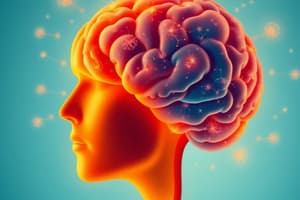Podcast
Questions and Answers
What is the definition of emotional intelligence according to Peter Salovey and John Mayer?
What is the definition of emotional intelligence according to Peter Salovey and John Mayer?
- The ability to ignore emotions accurately and adaptively, to understand emotion and emotional knowledge, to suppress feelings to facilitate thought, and to manage emotions in oneself and others
- The ability to memorize emotions accurately and adaptively, to understand emotion and emotional knowledge, to use feelings to facilitate thought, and to manage emotions in oneself and others
- The ability to express emotions inaccurately and adaptively, to misunderstand emotion and emotional knowledge, to use feelings to inhibit thought, and to manage emotions in oneself and others
- The ability to perceive and express emotions accurately and adaptively, to understand emotion and emotional knowledge, to use feelings to facilitate thought, and to manage emotions in oneself and others (correct)
Who popularized the concept of emotional intelligence in 1995?
Who popularized the concept of emotional intelligence in 1995?
- Daniel Goleman (correct)
- Peter Salovey
- John Mayer
- Martin Seligman
What was developed to measure the four aspects of emotional intelligence?
What was developed to measure the four aspects of emotional intelligence?
- Mayer-Salovey-Caruso Emotional Intelligence Test (MSCEIT) (correct)
- IQ test
- Memory test
- Personality quiz
What are the four aspects of emotional intelligence tested by MSCEIT?
What are the four aspects of emotional intelligence tested by MSCEIT?
What is linked to creative thinking according to the text?
What is linked to creative thinking according to the text?
Why do many adolescents not effectively manage their emotions?
Why do many adolescents not effectively manage their emotions?
Which of the following problems is NOT mentioned as a potential consequence of poor emotional regulation in adolescents?
Which of the following problems is NOT mentioned as a potential consequence of poor emotional regulation in adolescents?
What is an example of adaptively coping with negative emotions according to the text?
What is an example of adaptively coping with negative emotions according to the text?
What is the main role of emotional intelligence (EQ) according to HELPGUIDE.ORG?
What is the main role of emotional intelligence (EQ) according to HELPGUIDE.ORG?
How does uncontrolled stress impact physical health according to the text?
How does uncontrolled stress impact physical health according to the text?
What is the main factor many companies now view as being as important as technical ability when gauging job candidates according to the text?
What is the main factor many companies now view as being as important as technical ability when gauging job candidates according to the text?
What is the first step to improving emotional intelligence according to the text?
What is the first step to improving emotional intelligence according to the text?
What is NOT mentioned as a potential consequence of uncontrolled stress according to the text?
What is NOT mentioned as a potential consequence of uncontrolled stress according to the text?
What can emotional intelligence help manage according to HELPGUIDE.ORG?
What can emotional intelligence help manage according to HELPGUIDE.ORG?
What is the traditional family structure according to the text?
What is the traditional family structure according to the text?
Which family type has become more common as an alternative to the traditional nuclear family?
Which family type has become more common as an alternative to the traditional nuclear family?
What is the role of the extended family according to the text?
What is the role of the extended family according to the text?
What defines a single parent according to the text?
What defines a single parent according to the text?
What is the current preference of nuclear families regarding children according to the text?
What is the current preference of nuclear families regarding children according to the text?
Which family form has become less prevalent according to the text?
Which family form has become less prevalent according to the text?
What is the term used to describe families formed by the marriage or long-term cohabitation of two individuals, when one or both have at least one child from a previous relationship living part-time or full-time in the household?
What is the term used to describe families formed by the marriage or long-term cohabitation of two individuals, when one or both have at least one child from a previous relationship living part-time or full-time in the household?
What type of parents maintain firm control over their children through reasoning with them rather than depending on force?
What type of parents maintain firm control over their children through reasoning with them rather than depending on force?
Which family structure consists of grandparents, aunts, uncles, and cousins?
Which family structure consists of grandparents, aunts, uncles, and cousins?
What do you call parents who do not consistently enforce rules and do not have high expectations of their children?
What do you call parents who do not consistently enforce rules and do not have high expectations of their children?
Which family type often results from out of wedlock births?
Which family type often results from out of wedlock births?
What problem arises when a family member with an emotional or behavioral difficulty disturbs harmonious family relationships?
What problem arises when a family member with an emotional or behavioral difficulty disturbs harmonious family relationships?
What is the term for parents who are depending on force alone to control their children rather than reasoning with them or praising them?
What is the term for parents who are depending on force alone to control their children rather than reasoning with them or praising them?
What method is often used to summarize relationships and issues within the family?
What method is often used to summarize relationships and issues within the family?
What type of families often result from the death of a spouse, for instance during childbirth?
What type of families often result from the death of a spouse, for instance during childbirth?
What percentage of children live with a relative other than a parent?
What percentage of children live with a relative other than a parent?
Flashcards
Emotional Intelligence
Emotional Intelligence
The ability to understand and manage emotions, both your own and others'.
Emotional Regulation
Emotional Regulation
The ability to control and manage one's emotions effectively.
Traditional Family
Traditional Family
A family with a mother, father, and children living together.
Single-Parent Family
Single-Parent Family
Signup and view all the flashcards
Extended Family
Extended Family
Signup and view all the flashcards
Blended Family
Blended Family
Signup and view all the flashcards
Nuclear Family
Nuclear Family
Signup and view all the flashcards
Authoritarian Family
Authoritarian Family
Signup and view all the flashcards
Permissive Family
Permissive Family
Signup and view all the flashcards
Family Relationships Disruption
Family Relationships Disruption
Signup and view all the flashcards
Genogram
Genogram
Signup and view all the flashcards
Stress Impact on Health
Stress Impact on Health
Signup and view all the flashcards
Emotional regulation helps
Emotional regulation helps
Signup and view all the flashcards
MSCEIT
MSCEIT
Signup and view all the flashcards
Emotional intelligence aspects
Emotional intelligence aspects
Signup and view all the flashcards
Adolescent Emotional Management
Adolescent Emotional Management
Signup and view all the flashcards
Emotional Difficulty
Emotional Difficulty
Signup and view all the flashcards
Study Notes
Emotional Intelligence
- Emotional intelligence is defined by Peter Salovey and John Mayer as the ability to monitor and regulate one's own and others' emotions.
- The concept of emotional intelligence was popularized in 1995 by Daniel Goleman.
- The Mayer-Salovey-Caruso Emotional Intelligence Test (MSCEIT) was developed to measure the four aspects of emotional intelligence: perceiving, using, understanding, and managing emotions.
- The four aspects of emotional intelligence tested by MSCEIT are perceiving, using, understanding, and managing emotions.
- Creative thinking is linked to emotional intelligence.
Emotional Regulation
- Many adolescents do not effectively manage their emotions due to a lack of emotional regulation.
- Uncontrolled stress can lead to physical health problems, such as hypertension and cardiovascular disease.
- Emotional intelligence helps manage emotions and stress.
Family Structure
- The traditional family structure consists of a father, mother, and children.
- The single-parent family type is defined as a family with one parent, who is responsible for the care and upbringing of the children.
- The extended family structure consists of grandparents, aunts, uncles, and cousins.
- The blended family structure is formed by the marriage or long-term cohabitation of two individuals, when one or both have at least one child from a previous relationship living part-time or full-time in the household.
- The nuclear family prefers to have fewer children.
- The single-parent family type has become more common as an alternative to the traditional nuclear family.
- The authoritarian family type maintains firm control over their children through reasoning with them rather than depending on force.
- The permissive family type does not consistently enforce rules and does not have high expectations of their children.
- The authoritarian family type depends on force alone to control their children rather than reasoning with them or praising them.
Family Relationships
- Emotional or behavioral difficulties in a family member can disturb harmonious family relationships.
- The genogram method is often used to summarize relationships and issues within the family.
- About 4% of children live with a relative other than a parent.
Studying That Suits You
Use AI to generate personalized quizzes and flashcards to suit your learning preferences.




